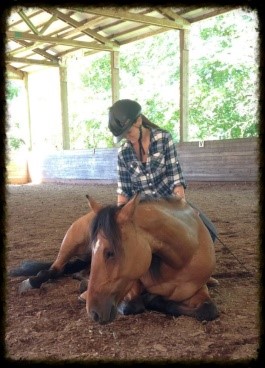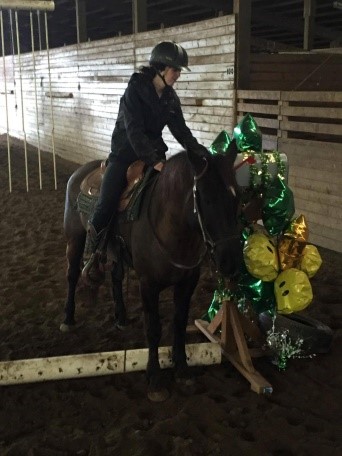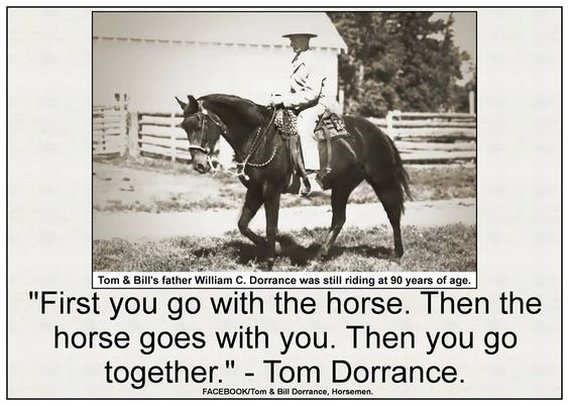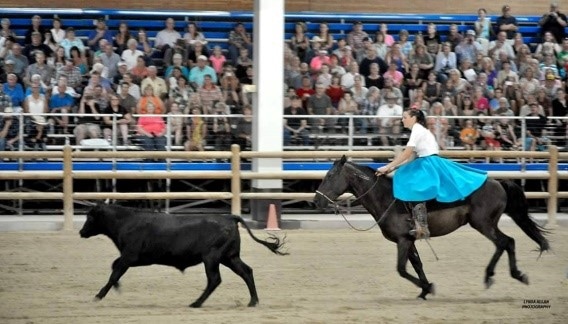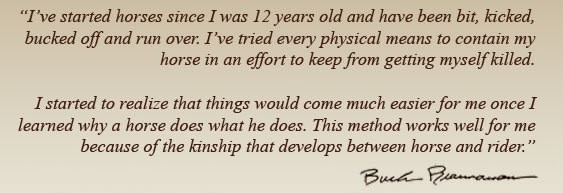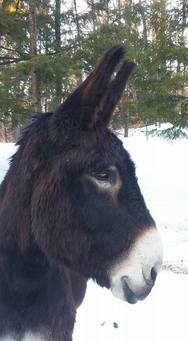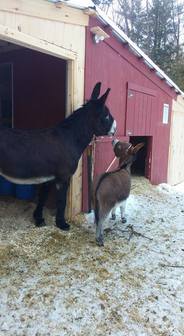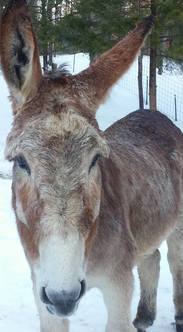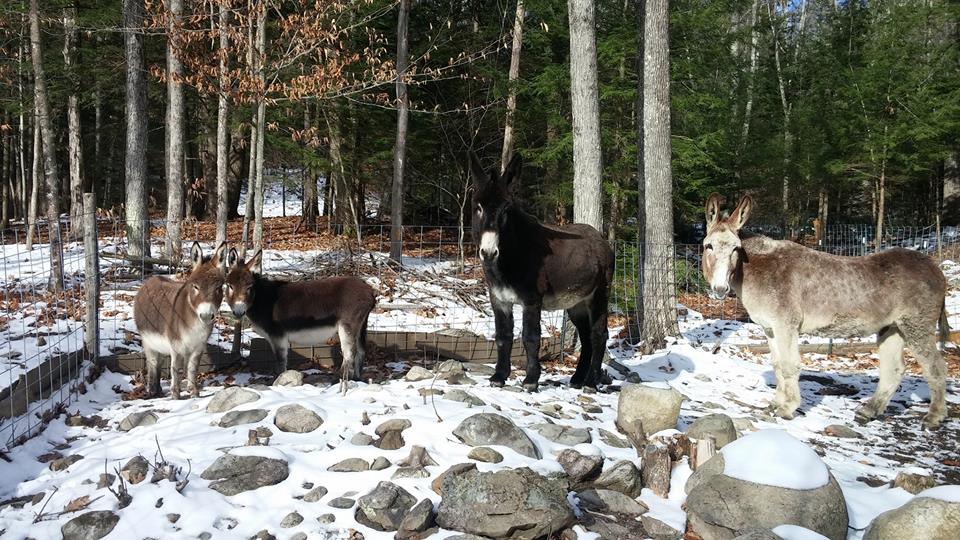TRAINER TIPS |
January/February 2017
|
|
|
WHITNEY CAMPBELL
Whitney Campbell is a 29 year old horsewoman from Lake Stevens, Washington who began her riding career at the age of seven, knowing it would become a lifelong passion she would continue to pursue. At 15, she graduated top of her class in a certification program held by select certified John Lyons trainers, Ron Valentine and Kathy Joseph, and continued to improve her riding skills and training methods. By 19, she had an opportunity to move onto a ranch in Wyoming run by world renowned clinician, Ken McNabb to ride and train for him for 6 months. She has since gotten married, finished her degree, and is raising her 3 wonderful children. Whitney now owns and operates her own horsemanship program specializing in training mustangs and problem horses/riders. |
The American Mustang: A Sensitive Soul in a Desensitized World
by Whitney Campbell
In the fall of 2014, I received an almost 2 year old mustang gelding in for training. He was a sweet little horse that his new owners wanted advanced ground training and prep work completed to start him under saddle before they turned him out to grow and mature for a year or two. The day he showed up, he was about 4 months out of the corrals and as dead headed and sad as they come. He walked out to his paddock with his head hanging low, refusing to greet the other horses around him [also mustangs]. Everyone was amazed that a 2 year old could have such a “quiet mind” and how nice of a trail horse he would become.
We gave him a couple days to settle in to his new digs before we began the training process. No amount of flagging, sending, or driving him away would get a rise in his emotions. This little baby was a drone. He was a horse that had become completely shut down emotionally. A robot.
“He’s so quiet! Like he was born ‘bombproof’” – ah, there’s that word! BOMBPROOF! It has become a favorite among the horse community.
“I am looking for a nice trail gelding. Not herd bound, no spook, bolt, buck, etc. I am looking for bombproof.” – There’s that word again. Bombproof.
We gave him a couple days to settle in to his new digs before we began the training process. No amount of flagging, sending, or driving him away would get a rise in his emotions. This little baby was a drone. He was a horse that had become completely shut down emotionally. A robot.
“He’s so quiet! Like he was born ‘bombproof’” – ah, there’s that word! BOMBPROOF! It has become a favorite among the horse community.
“I am looking for a nice trail gelding. Not herd bound, no spook, bolt, buck, etc. I am looking for bombproof.” – There’s that word again. Bombproof.
|
We’ve all said it at least once if you’ve been around horses for any length of time. Clinicians make tens of thousands of dollars every year from the sale of “things” in which to desensitize your horses. Some might make a video of how to desensitize your horse to anything from tarps, bridges, ropes, plastic bags, etc. However, what most people fail to realize, is that there is a finite balance between desensitizing and sensitizing that creates a wonderful and willing partner vs. a complete mental shut down of the horse like the one previously mentioned. Not many people have heard of the word sensitizing in relation to horses. Why? The majority of riders out there are beginner to novice at best, with horses of the same level of training, which allows for rider fear to take over. Don’t get me wrong, rider fear is a very real thing we all experience. I have had my share of wrecks in over 20 years of riding with a few I should not have lived through let alone walked away from. However, when that fear comes out as a need for control, the horse is the one who suffers. ← Nykko – 7 year old Mustang gelding, 60 days from the corrals and less than 20 rides. Never has seen balloons in his life.
|
Many people fear that at some point they will be out riding when their horse will spook and they won’t know how to react or react fast enough to stay safe. Thus begins the search for the almighty “bombproof” horse or a trainer that can help them get to that place with their own horse. That’s when some people think it’s a good idea to strap objects to the saddle (buoys, tarps, pool noodles, milk jugs, etc.) and they get tied for hours until they “figure it out”. A horse’s mind does not work like that at all and especially the mind of a mustang who still has very strong fight or flight instincts well intact. It’s like a game of Survivor: Outwit, Outplay, Outlast. It is just a matter of who will break first.
Sadly, bombproof horses exist but at the cost of their mental well-being. You’ve seen them; the “beach ride” horses, or “dude string” horses that follow the horse in front of them with no life left in their eyes regardless of the rider on their back. They have been desensitized to a fault – so much so that they learn to just ignore everything aka: shut down. Great riding is about Lightness, communication, partnership. With time and consistency we can all get there. “It doesn’t take the time, if you take the time it takes.” – John Lyons
Sadly, bombproof horses exist but at the cost of their mental well-being. You’ve seen them; the “beach ride” horses, or “dude string” horses that follow the horse in front of them with no life left in their eyes regardless of the rider on their back. They have been desensitized to a fault – so much so that they learn to just ignore everything aka: shut down. Great riding is about Lightness, communication, partnership. With time and consistency we can all get there. “It doesn’t take the time, if you take the time it takes.” – John Lyons
|
So, I challenge you to take that time to build a relationship with your horse. If your horse believes you are trustworthy they will then trust you in situations when the buck, bolt or rear would seem obvious and wait for your guidance instead. Horses are incredible communicators. Masters really. It is our responsibility to pay attention and to listen to them. They know more about you before you ever lay hands on them. “I believe horses naturally have tremendous faith in the human being. It is their natural instinct of self-preservation that the human needs to understand in order to gain the confidence in the horse.” –Tom Dorrance |
Henry – 7 year old Mustang gelding competing at the Idaho Mustang Makeover 2016. 25 total rides – 4th place overall
|
|
The bombproof horse learns to shut out all stimulation. Therefore, we as riders, exchange a willing partner for the false illusion of safety – a dull, mindless, lifeless animal. We owe it to our horses to become better horsemen creating a balance between sensitizing and desensitizing in order to achieve a willing partner with a balanced mindset. |
READER CONTRIBUTION
Lynne P. from Maine is the proud new owner of two mammoth jack rescues from Save Your Ass Long Ear Rescue. Gus and Asstro join Lynne and Sue's herd of mini donkeys, Ellie Mae and Dakota at Tuckaway Tree Farm.
Ellie Mae and Dakota (left) enjoying a snowy day in Maine with Asstro and Gus, Mammoth Jacks, who were adopted from Save Your Ass Long Ear Rescue in NH.
Save Your Ass Long Ear Rescue - New England's only 501 (c) (3) Non-Profit Donkey and Mule Rescue
23 Saw Mill Road, South Acworth, NH, 03607 (603) 835-2971
Visit on Facebook - "Save Your Ass Long Ear Rescue"
Save Your Ass Long Ear Rescue was incorporated as a 501-(c)(3), non-profit organization in 2007. We are dedicated to the rescue, rehabilitation, and re-homing of donkeys and mules in need. By providing educational opportunities that increase awareness of the human/animal bond as well as the specific needs of long ears, SYA is able to improve the lives of donkeys and mules everywhere.
23 Saw Mill Road, South Acworth, NH, 03607 (603) 835-2971
Visit on Facebook - "Save Your Ass Long Ear Rescue"
Save Your Ass Long Ear Rescue was incorporated as a 501-(c)(3), non-profit organization in 2007. We are dedicated to the rescue, rehabilitation, and re-homing of donkeys and mules in need. By providing educational opportunities that increase awareness of the human/animal bond as well as the specific needs of long ears, SYA is able to improve the lives of donkeys and mules everywhere.
